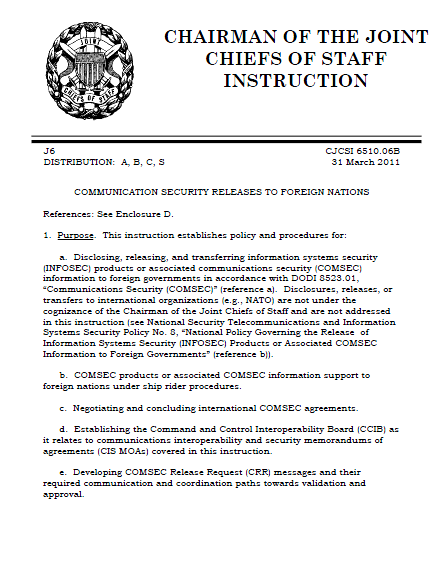The following instruction is part of a series of “limited release” DoD doctrine publications that are not released to the public.
CHAIRMAN OF THE JOINT CHIEFS OF STAFF INSTRUCTION 6510.06B: COMMUNICATION SECURITY RELEASES TO FOREIGN NATIONS
- 94 pages
- March 31, 2011
1. Purpose. This instruction establishes policy and procedures for:
a. Disclosing, releasing, and transferring information systems security (INFOSEC) products or associated communications security (COMSEC) information to foreign governments in accordance with DODI 8523.01, “Communications Security (COMSEC)” (reference a). Disclosures, releases, or transfers to international organizations (e.g., NATO) are not under the cognizance of the Chairman of the Joint Chiefs of Staff and are not addressed in this instruction (see National Security Telecommunications and Information Systems Security Policy No. 8, “National Policy Governing the Release of Information Systems Security (INFOSEC) Products or Associated COMSEC Information to Foreign Governments” (reference b)).
b. COMSEC products or associated COMSEC information support to foreign nations under ship rider procedures.
c. Negotiating and concluding international COMSEC agreements.
d. Establishing the Command and Control Interoperability Board (CCIB) as it relates to communications interoperability and security memorandums of agreements (CIS MOAs) covered in this instruction.
e. Developing COMSEC Release Request (CRR) messages and their required communication and coordination paths towards validation and approval.
f. Releasing Department of Defense procedural message standards required by CIS MOAs.
…
1. Criteria for Release of COMSEC Products and Information. The Chairman of the Joint Chiefs of Staff (hereinafter “Chairman”) will validate combatant command interoperability requirements to release COMSEC products or associated COMSEC information to any foreign government (including Combined Communications-Electronics Board (CCEB),i NATO nations, and non-NATO nations). COMSEC interoperability requirements originating from the Military Departments, their respective Services, the Defense agencies, PMOs, and the DOD Field Activities must be reviewed by all affected combatant commands in which the foreign partner resides and operates. When a request crosses multiple command areas of responsibility (AORs), only a single combined request is required (see Cross-Combatant Command section in Enclosure A, paragraph 8). These requests also require Joint Staff review and validation. Combatant commands may recommend the desired solution; however, the Director of the National Security Agency (DIRNSA) will select the appropriate COMSEC solution, and the Committee on National Security Systems (CNSS) will determine releases in accordance with NSTISSP 8 (reference b). In all cases, the most important criteria supporting a COMSEC release are the combatant command validation and/or endorsement of an emerging or documented interoperability requirement requiring secure communications. An ally or coalition partner’s desire to be interoperable with a U.S. combatant command is not, in and of itself, sufficient justification for such releases.
a. All requests for release of U.S. government (USG) COMSEC products or associated COMSEC information must:
(1) Be consistent with USG foreign policy and military or economic objectives;
(2) Have no unacceptable impact on USG signals intelligence (SIGINT) activities; and
(3) Not impact adversely on the overall INFOSEC posture of the USG.b. In addition, requests must meet at least one of the two criteria detailed
below:(1) Enhance the objectives and effectiveness of mutual USG defense arrangements or coalition operations by providing a means for achieving secure communications interoperability when exchanging military planning information or conducting combined or coalition combat operations that involve U.S. military forces and the military forces of a foreign government(s).
(2) Protect USG national security information that is provided to or exchanged with a foreign government in support of USG efforts to combat the transnational threats of international crime, international terrorism, international drug trafficking, or proliferation of weapons of mass destruction. The Joint Staff may request combatant command endorsement of requirements involving said transnational threats.2. Limitations. Provided the criteria in paragraph 1 of this enclosure are satisfied, the following limitations apply to the release of COMSEC products or associated COMSEC information:
a. COMSEC products or associated COMSEC information included in weapons, communications, or other major defense systems to provide a complete package for Foreign Military Sales (FMS), or initiatives to promote international competition for system procurements, are not, in and of themselves, acceptable justifications for seeking release of those products or information.
b. U.S. COMSEC products or associated COMSEC information will not normally be authorized for release solely for purposes of improving the internal national INFOSEC posture of a foreign government.

